Leadership vs Management: Roles, Theories, and Operational Approaches
VerifiedAdded on 2020/06/04
|14
|4460
|34
Report
AI Summary
This report provides a comprehensive overview of leadership and management, focusing on their distinct roles and characteristics within an organization, particularly using Tesco plc as a case study. It defines and compares the roles of leaders and managers, emphasizing the importance of both for achieving organizational goals. The report explores various leadership theories, including situational, contingency, and systems theories, illustrating their application in different scenarios. Furthermore, it delves into the key approaches of operational management, highlighting their significance in achieving business objectives and assessing environmental factors that impact operational decision-making. The report concludes by summarizing the critical aspects of effective leadership and management practices.
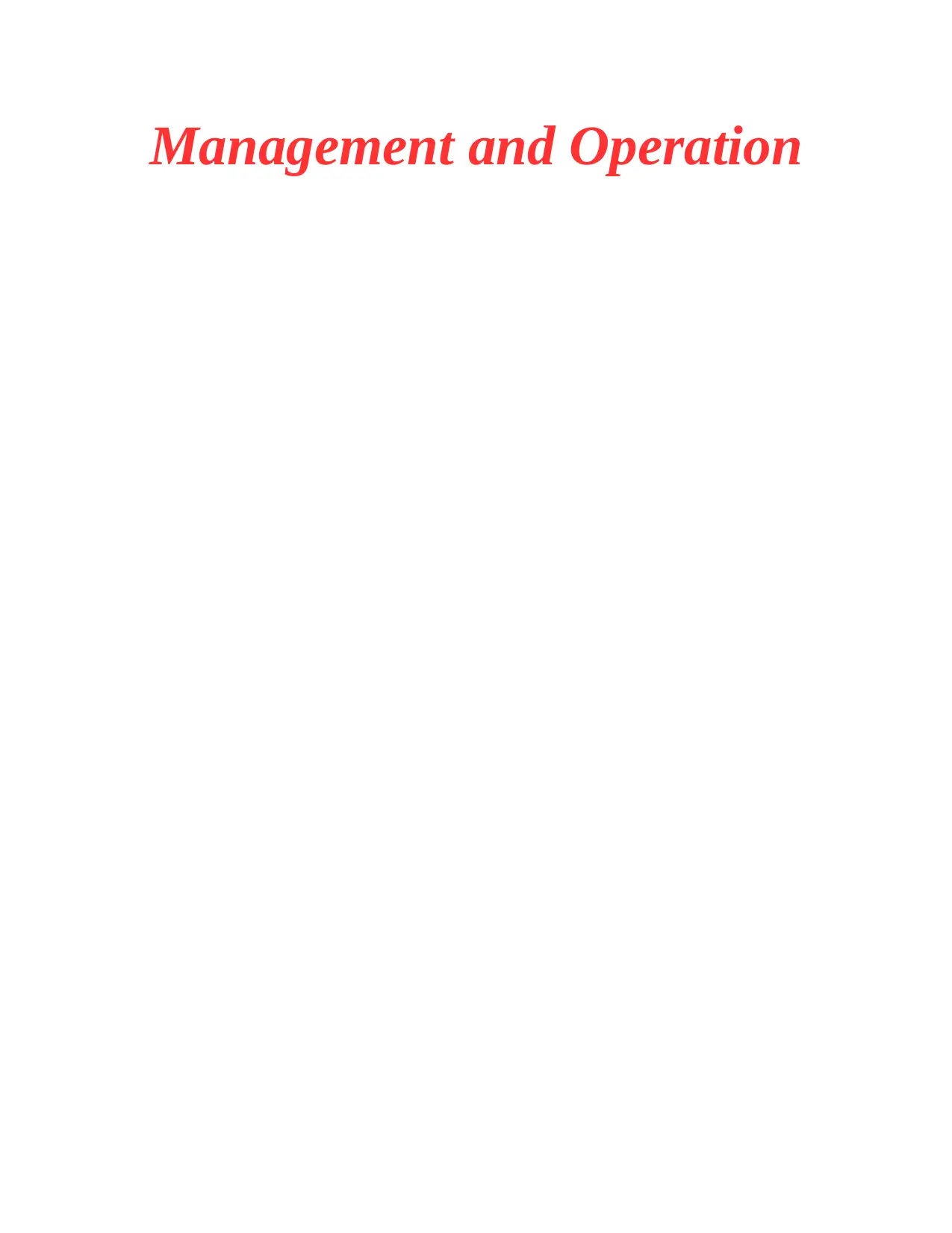
Management and Operation
Paraphrase This Document
Need a fresh take? Get an instant paraphrase of this document with our AI Paraphraser
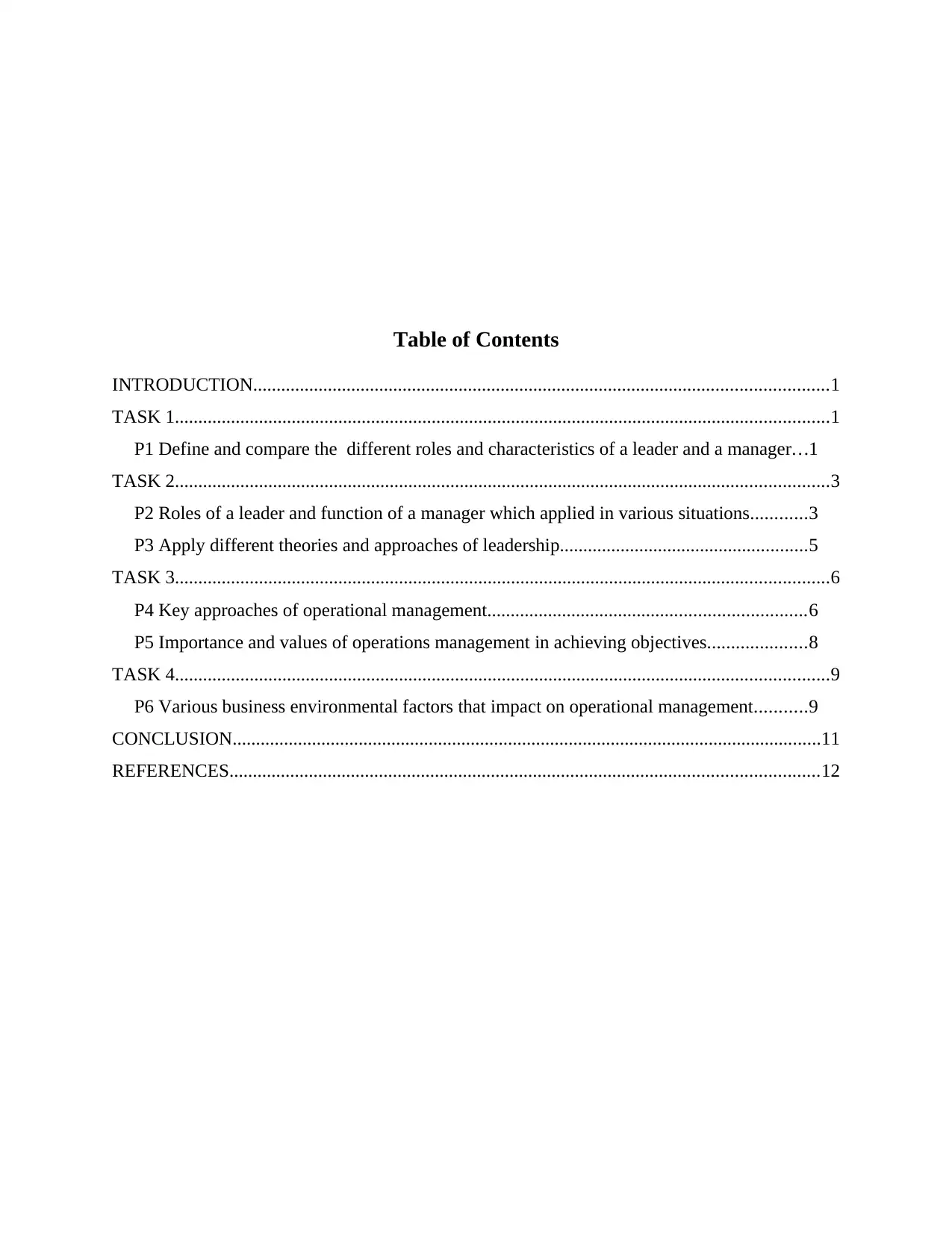
Table of Contents
INTRODUCTION...........................................................................................................................1
TASK 1............................................................................................................................................1
P1 Define and compare the different roles and characteristics of a leader and a manager...1
TASK 2............................................................................................................................................3
P2 Roles of a leader and function of a manager which applied in various situations............3
P3 Apply different theories and approaches of leadership.....................................................5
TASK 3............................................................................................................................................6
P4 Key approaches of operational management....................................................................6
P5 Importance and values of operations management in achieving objectives.....................8
TASK 4............................................................................................................................................9
P6 Various business environmental factors that impact on operational management...........9
CONCLUSION..............................................................................................................................11
REFERENCES..............................................................................................................................12
INTRODUCTION...........................................................................................................................1
TASK 1............................................................................................................................................1
P1 Define and compare the different roles and characteristics of a leader and a manager...1
TASK 2............................................................................................................................................3
P2 Roles of a leader and function of a manager which applied in various situations............3
P3 Apply different theories and approaches of leadership.....................................................5
TASK 3............................................................................................................................................6
P4 Key approaches of operational management....................................................................6
P5 Importance and values of operations management in achieving objectives.....................8
TASK 4............................................................................................................................................9
P6 Various business environmental factors that impact on operational management...........9
CONCLUSION..............................................................................................................................11
REFERENCES..............................................................................................................................12
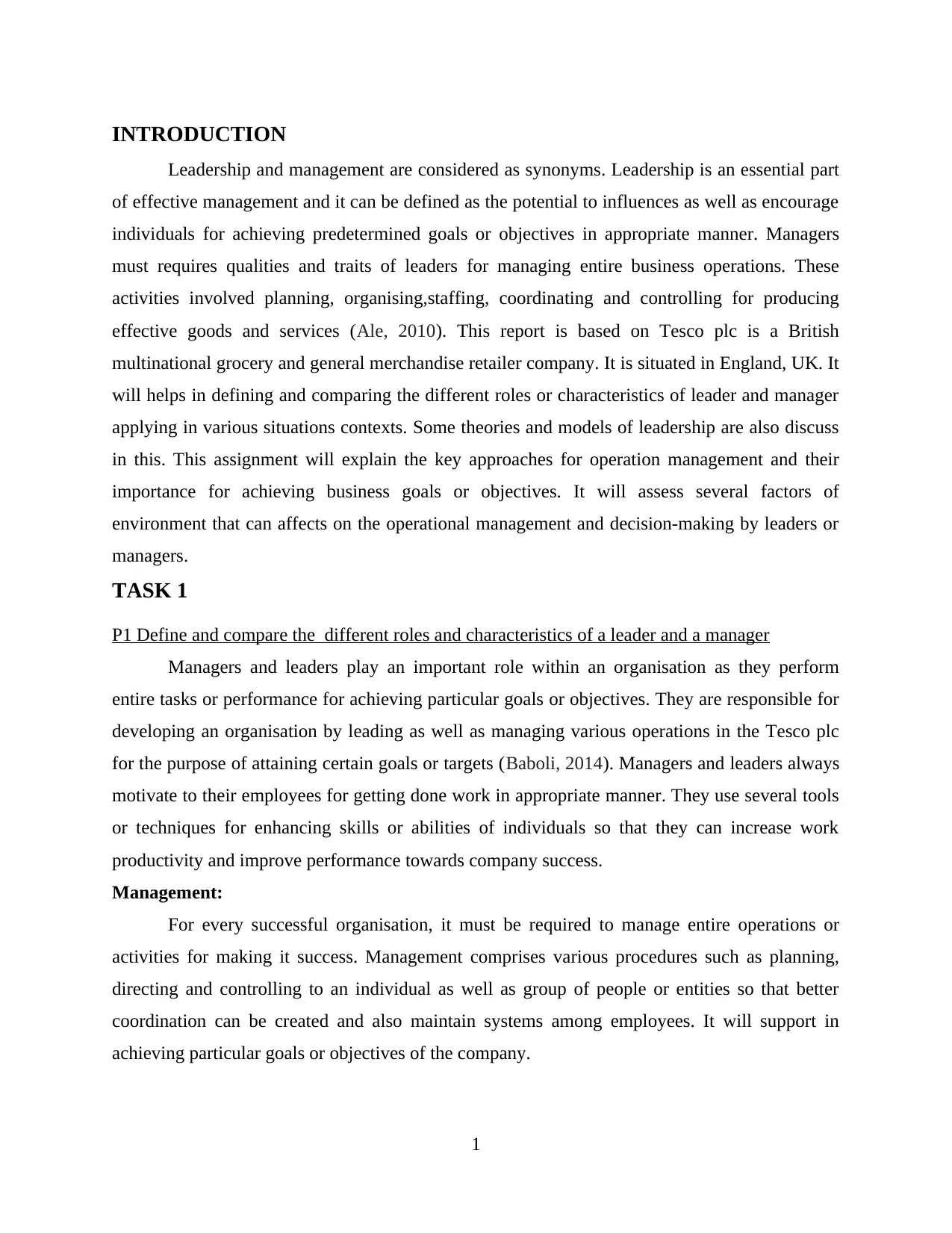
INTRODUCTION
Leadership and management are considered as synonyms. Leadership is an essential part
of effective management and it can be defined as the potential to influences as well as encourage
individuals for achieving predetermined goals or objectives in appropriate manner. Managers
must requires qualities and traits of leaders for managing entire business operations. These
activities involved planning, organising,staffing, coordinating and controlling for producing
effective goods and services (Ale, 2010). This report is based on Tesco plc is a British
multinational grocery and general merchandise retailer company. It is situated in England, UK. It
will helps in defining and comparing the different roles or characteristics of leader and manager
applying in various situations contexts. Some theories and models of leadership are also discuss
in this. This assignment will explain the key approaches for operation management and their
importance for achieving business goals or objectives. It will assess several factors of
environment that can affects on the operational management and decision-making by leaders or
managers.
TASK 1
P1 Define and compare the different roles and characteristics of a leader and a manager
Managers and leaders play an important role within an organisation as they perform
entire tasks or performance for achieving particular goals or objectives. They are responsible for
developing an organisation by leading as well as managing various operations in the Tesco plc
for the purpose of attaining certain goals or targets (Baboli, 2014). Managers and leaders always
motivate to their employees for getting done work in appropriate manner. They use several tools
or techniques for enhancing skills or abilities of individuals so that they can increase work
productivity and improve performance towards company success.
Management:
For every successful organisation, it must be required to manage entire operations or
activities for making it success. Management comprises various procedures such as planning,
directing and controlling to an individual as well as group of people or entities so that better
coordination can be created and also maintain systems among employees. It will support in
achieving particular goals or objectives of the company.
1
Leadership and management are considered as synonyms. Leadership is an essential part
of effective management and it can be defined as the potential to influences as well as encourage
individuals for achieving predetermined goals or objectives in appropriate manner. Managers
must requires qualities and traits of leaders for managing entire business operations. These
activities involved planning, organising,staffing, coordinating and controlling for producing
effective goods and services (Ale, 2010). This report is based on Tesco plc is a British
multinational grocery and general merchandise retailer company. It is situated in England, UK. It
will helps in defining and comparing the different roles or characteristics of leader and manager
applying in various situations contexts. Some theories and models of leadership are also discuss
in this. This assignment will explain the key approaches for operation management and their
importance for achieving business goals or objectives. It will assess several factors of
environment that can affects on the operational management and decision-making by leaders or
managers.
TASK 1
P1 Define and compare the different roles and characteristics of a leader and a manager
Managers and leaders play an important role within an organisation as they perform
entire tasks or performance for achieving particular goals or objectives. They are responsible for
developing an organisation by leading as well as managing various operations in the Tesco plc
for the purpose of attaining certain goals or targets (Baboli, 2014). Managers and leaders always
motivate to their employees for getting done work in appropriate manner. They use several tools
or techniques for enhancing skills or abilities of individuals so that they can increase work
productivity and improve performance towards company success.
Management:
For every successful organisation, it must be required to manage entire operations or
activities for making it success. Management comprises various procedures such as planning,
directing and controlling to an individual as well as group of people or entities so that better
coordination can be created and also maintain systems among employees. It will support in
achieving particular goals or objectives of the company.
1
⊘ This is a preview!⊘
Do you want full access?
Subscribe today to unlock all pages.

Trusted by 1+ million students worldwide
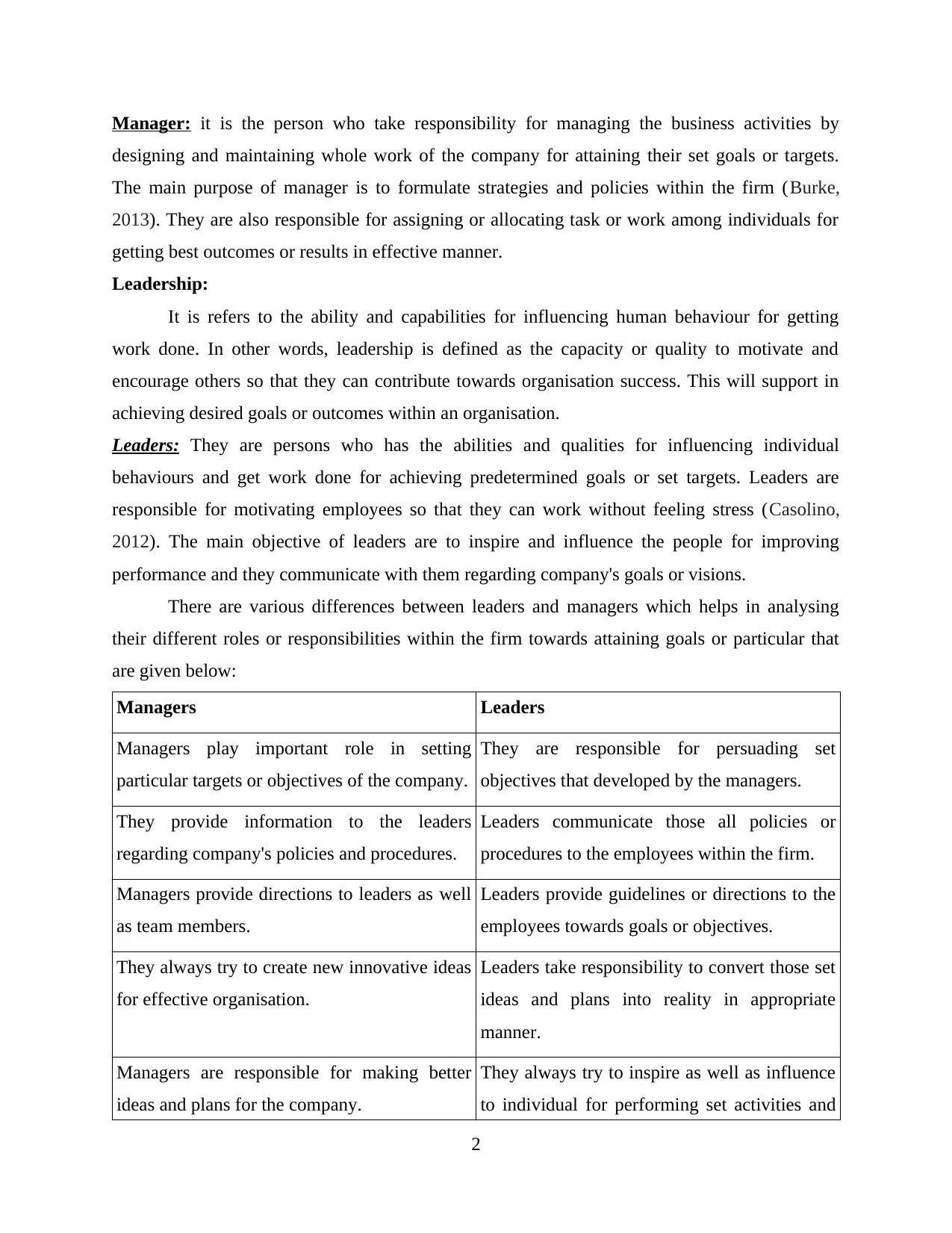
Manager: it is the person who take responsibility for managing the business activities by
designing and maintaining whole work of the company for attaining their set goals or targets.
The main purpose of manager is to formulate strategies and policies within the firm (Burke,
2013). They are also responsible for assigning or allocating task or work among individuals for
getting best outcomes or results in effective manner.
Leadership:
It is refers to the ability and capabilities for influencing human behaviour for getting
work done. In other words, leadership is defined as the capacity or quality to motivate and
encourage others so that they can contribute towards organisation success. This will support in
achieving desired goals or outcomes within an organisation.
Leaders: They are persons who has the abilities and qualities for influencing individual
behaviours and get work done for achieving predetermined goals or set targets. Leaders are
responsible for motivating employees so that they can work without feeling stress (Casolino,
2012). The main objective of leaders are to inspire and influence the people for improving
performance and they communicate with them regarding company's goals or visions.
There are various differences between leaders and managers which helps in analysing
their different roles or responsibilities within the firm towards attaining goals or particular that
are given below:
Managers Leaders
Managers play important role in setting
particular targets or objectives of the company.
They are responsible for persuading set
objectives that developed by the managers.
They provide information to the leaders
regarding company's policies and procedures.
Leaders communicate those all policies or
procedures to the employees within the firm.
Managers provide directions to leaders as well
as team members.
Leaders provide guidelines or directions to the
employees towards goals or objectives.
They always try to create new innovative ideas
for effective organisation.
Leaders take responsibility to convert those set
ideas and plans into reality in appropriate
manner.
Managers are responsible for making better
ideas and plans for the company.
They always try to inspire as well as influence
to individual for performing set activities and
2
designing and maintaining whole work of the company for attaining their set goals or targets.
The main purpose of manager is to formulate strategies and policies within the firm (Burke,
2013). They are also responsible for assigning or allocating task or work among individuals for
getting best outcomes or results in effective manner.
Leadership:
It is refers to the ability and capabilities for influencing human behaviour for getting
work done. In other words, leadership is defined as the capacity or quality to motivate and
encourage others so that they can contribute towards organisation success. This will support in
achieving desired goals or outcomes within an organisation.
Leaders: They are persons who has the abilities and qualities for influencing individual
behaviours and get work done for achieving predetermined goals or set targets. Leaders are
responsible for motivating employees so that they can work without feeling stress (Casolino,
2012). The main objective of leaders are to inspire and influence the people for improving
performance and they communicate with them regarding company's goals or visions.
There are various differences between leaders and managers which helps in analysing
their different roles or responsibilities within the firm towards attaining goals or particular that
are given below:
Managers Leaders
Managers play important role in setting
particular targets or objectives of the company.
They are responsible for persuading set
objectives that developed by the managers.
They provide information to the leaders
regarding company's policies and procedures.
Leaders communicate those all policies or
procedures to the employees within the firm.
Managers provide directions to leaders as well
as team members.
Leaders provide guidelines or directions to the
employees towards goals or objectives.
They always try to create new innovative ideas
for effective organisation.
Leaders take responsibility to convert those set
ideas and plans into reality in appropriate
manner.
Managers are responsible for making better
ideas and plans for the company.
They always try to inspire as well as influence
to individual for performing set activities and
2
Paraphrase This Document
Need a fresh take? Get an instant paraphrase of this document with our AI Paraphraser
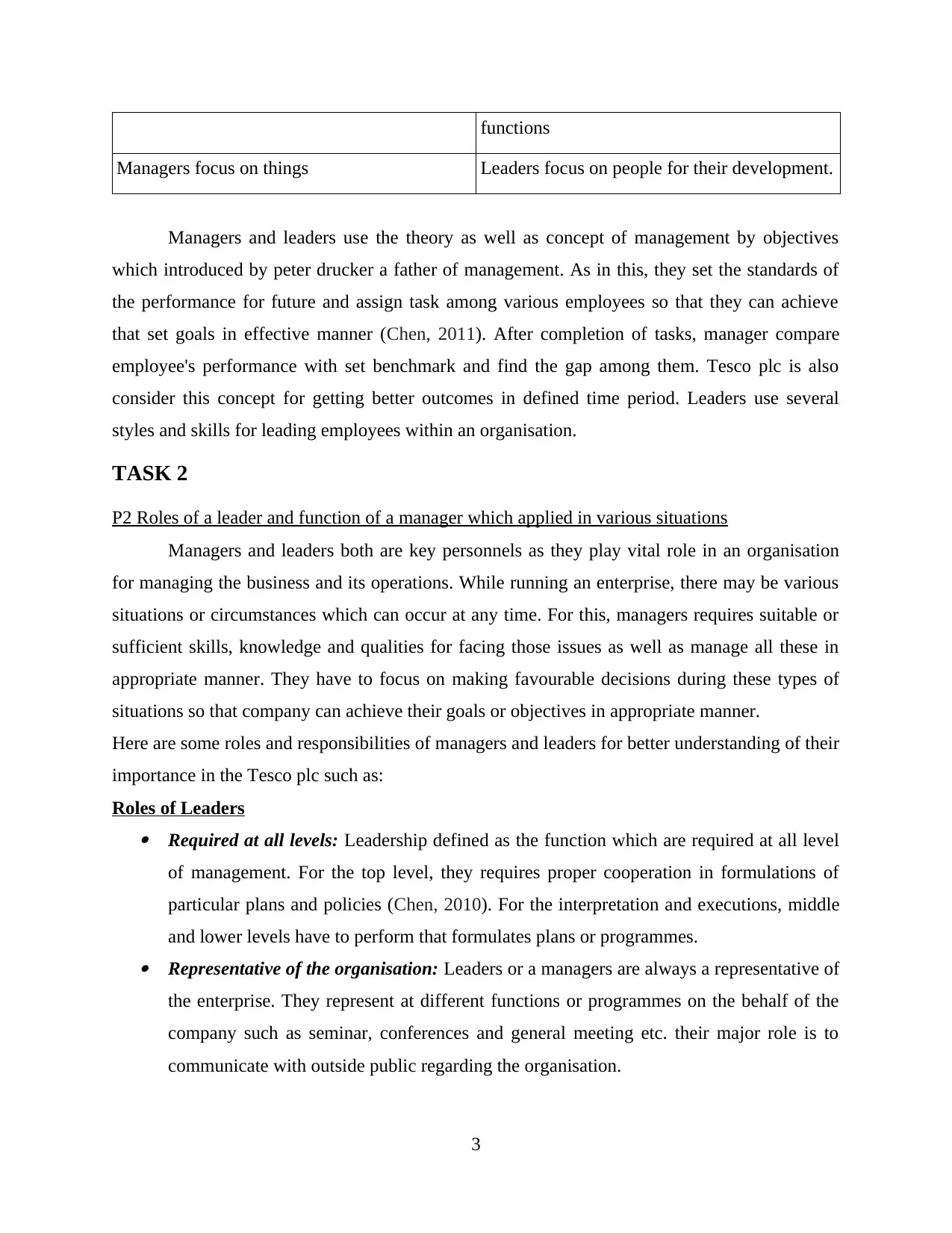
functions
Managers focus on things Leaders focus on people for their development.
Managers and leaders use the theory as well as concept of management by objectives
which introduced by peter drucker a father of management. As in this, they set the standards of
the performance for future and assign task among various employees so that they can achieve
that set goals in effective manner (Chen, 2011). After completion of tasks, manager compare
employee's performance with set benchmark and find the gap among them. Tesco plc is also
consider this concept for getting better outcomes in defined time period. Leaders use several
styles and skills for leading employees within an organisation.
TASK 2
P2 Roles of a leader and function of a manager which applied in various situations
Managers and leaders both are key personnels as they play vital role in an organisation
for managing the business and its operations. While running an enterprise, there may be various
situations or circumstances which can occur at any time. For this, managers requires suitable or
sufficient skills, knowledge and qualities for facing those issues as well as manage all these in
appropriate manner. They have to focus on making favourable decisions during these types of
situations so that company can achieve their goals or objectives in appropriate manner.
Here are some roles and responsibilities of managers and leaders for better understanding of their
importance in the Tesco plc such as:
Roles of Leaders Required at all levels: Leadership defined as the function which are required at all level
of management. For the top level, they requires proper cooperation in formulations of
particular plans and policies (Chen, 2010). For the interpretation and executions, middle
and lower levels have to perform that formulates plans or programmes. Representative of the organisation: Leaders or a managers are always a representative of
the enterprise. They represent at different functions or programmes on the behalf of the
company such as seminar, conferences and general meeting etc. their major role is to
communicate with outside public regarding the organisation.
3
Managers focus on things Leaders focus on people for their development.
Managers and leaders use the theory as well as concept of management by objectives
which introduced by peter drucker a father of management. As in this, they set the standards of
the performance for future and assign task among various employees so that they can achieve
that set goals in effective manner (Chen, 2011). After completion of tasks, manager compare
employee's performance with set benchmark and find the gap among them. Tesco plc is also
consider this concept for getting better outcomes in defined time period. Leaders use several
styles and skills for leading employees within an organisation.
TASK 2
P2 Roles of a leader and function of a manager which applied in various situations
Managers and leaders both are key personnels as they play vital role in an organisation
for managing the business and its operations. While running an enterprise, there may be various
situations or circumstances which can occur at any time. For this, managers requires suitable or
sufficient skills, knowledge and qualities for facing those issues as well as manage all these in
appropriate manner. They have to focus on making favourable decisions during these types of
situations so that company can achieve their goals or objectives in appropriate manner.
Here are some roles and responsibilities of managers and leaders for better understanding of their
importance in the Tesco plc such as:
Roles of Leaders Required at all levels: Leadership defined as the function which are required at all level
of management. For the top level, they requires proper cooperation in formulations of
particular plans and policies (Chen, 2010). For the interpretation and executions, middle
and lower levels have to perform that formulates plans or programmes. Representative of the organisation: Leaders or a managers are always a representative of
the enterprise. They represent at different functions or programmes on the behalf of the
company such as seminar, conferences and general meeting etc. their major role is to
communicate with outside public regarding the organisation.
3
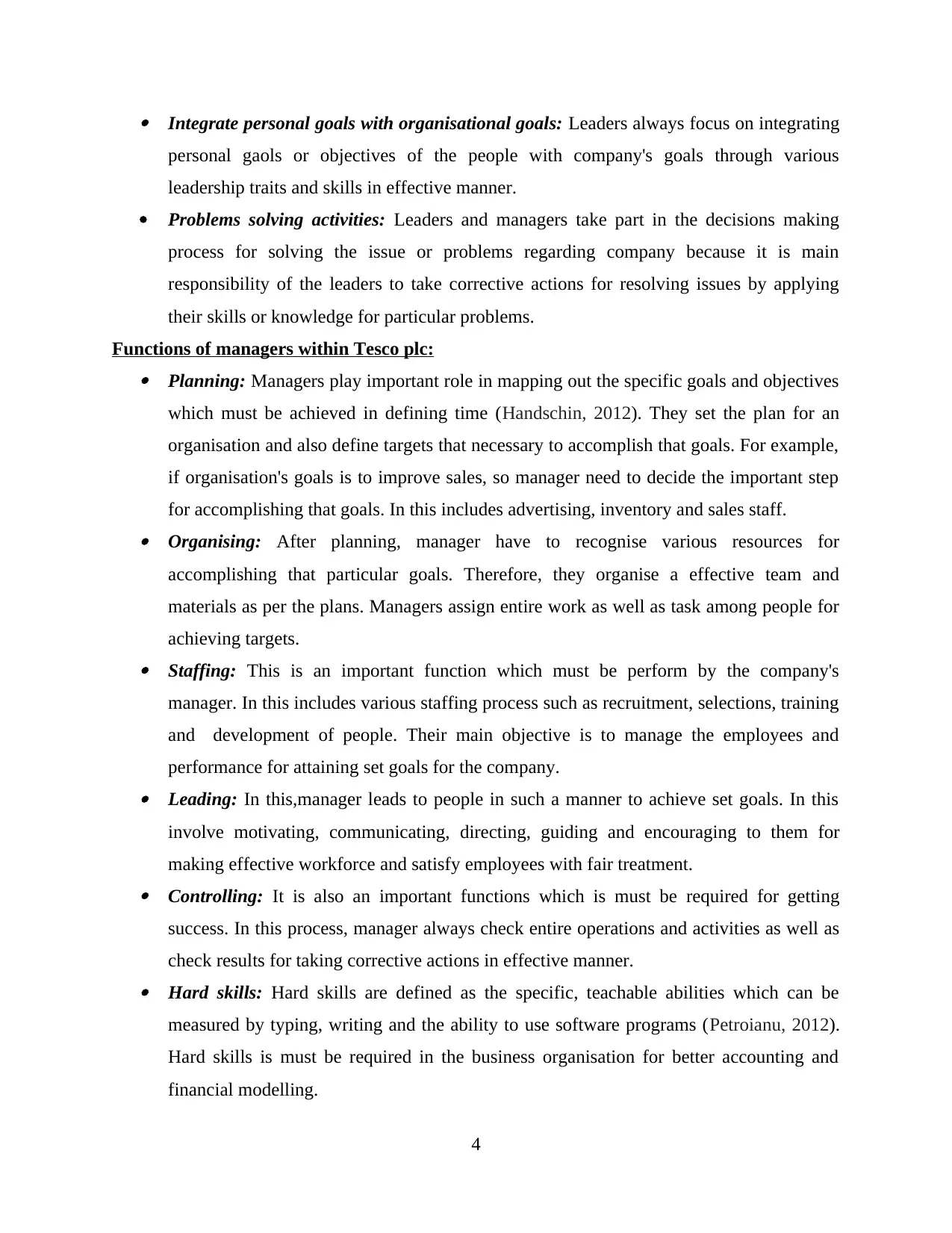
Integrate personal goals with organisational goals: Leaders always focus on integrating
personal gaols or objectives of the people with company's goals through various
leadership traits and skills in effective manner.
Problems solving activities: Leaders and managers take part in the decisions making
process for solving the issue or problems regarding company because it is main
responsibility of the leaders to take corrective actions for resolving issues by applying
their skills or knowledge for particular problems.
Functions of managers within Tesco plc: Planning: Managers play important role in mapping out the specific goals and objectives
which must be achieved in defining time (Handschin, 2012). They set the plan for an
organisation and also define targets that necessary to accomplish that goals. For example,
if organisation's goals is to improve sales, so manager need to decide the important step
for accomplishing that goals. In this includes advertising, inventory and sales staff. Organising: After planning, manager have to recognise various resources for
accomplishing that particular goals. Therefore, they organise a effective team and
materials as per the plans. Managers assign entire work as well as task among people for
achieving targets. Staffing: This is an important function which must be perform by the company's
manager. In this includes various staffing process such as recruitment, selections, training
and development of people. Their main objective is to manage the employees and
performance for attaining set goals for the company. Leading: In this,manager leads to people in such a manner to achieve set goals. In this
involve motivating, communicating, directing, guiding and encouraging to them for
making effective workforce and satisfy employees with fair treatment. Controlling: It is also an important functions which is must be required for getting
success. In this process, manager always check entire operations and activities as well as
check results for taking corrective actions in effective manner. Hard skills: Hard skills are defined as the specific, teachable abilities which can be
measured by typing, writing and the ability to use software programs (Petroianu, 2012).
Hard skills is must be required in the business organisation for better accounting and
financial modelling.
4
personal gaols or objectives of the people with company's goals through various
leadership traits and skills in effective manner.
Problems solving activities: Leaders and managers take part in the decisions making
process for solving the issue or problems regarding company because it is main
responsibility of the leaders to take corrective actions for resolving issues by applying
their skills or knowledge for particular problems.
Functions of managers within Tesco plc: Planning: Managers play important role in mapping out the specific goals and objectives
which must be achieved in defining time (Handschin, 2012). They set the plan for an
organisation and also define targets that necessary to accomplish that goals. For example,
if organisation's goals is to improve sales, so manager need to decide the important step
for accomplishing that goals. In this includes advertising, inventory and sales staff. Organising: After planning, manager have to recognise various resources for
accomplishing that particular goals. Therefore, they organise a effective team and
materials as per the plans. Managers assign entire work as well as task among people for
achieving targets. Staffing: This is an important function which must be perform by the company's
manager. In this includes various staffing process such as recruitment, selections, training
and development of people. Their main objective is to manage the employees and
performance for attaining set goals for the company. Leading: In this,manager leads to people in such a manner to achieve set goals. In this
involve motivating, communicating, directing, guiding and encouraging to them for
making effective workforce and satisfy employees with fair treatment. Controlling: It is also an important functions which is must be required for getting
success. In this process, manager always check entire operations and activities as well as
check results for taking corrective actions in effective manner. Hard skills: Hard skills are defined as the specific, teachable abilities which can be
measured by typing, writing and the ability to use software programs (Petroianu, 2012).
Hard skills is must be required in the business organisation for better accounting and
financial modelling.
4
⊘ This is a preview!⊘
Do you want full access?
Subscribe today to unlock all pages.

Trusted by 1+ million students worldwide
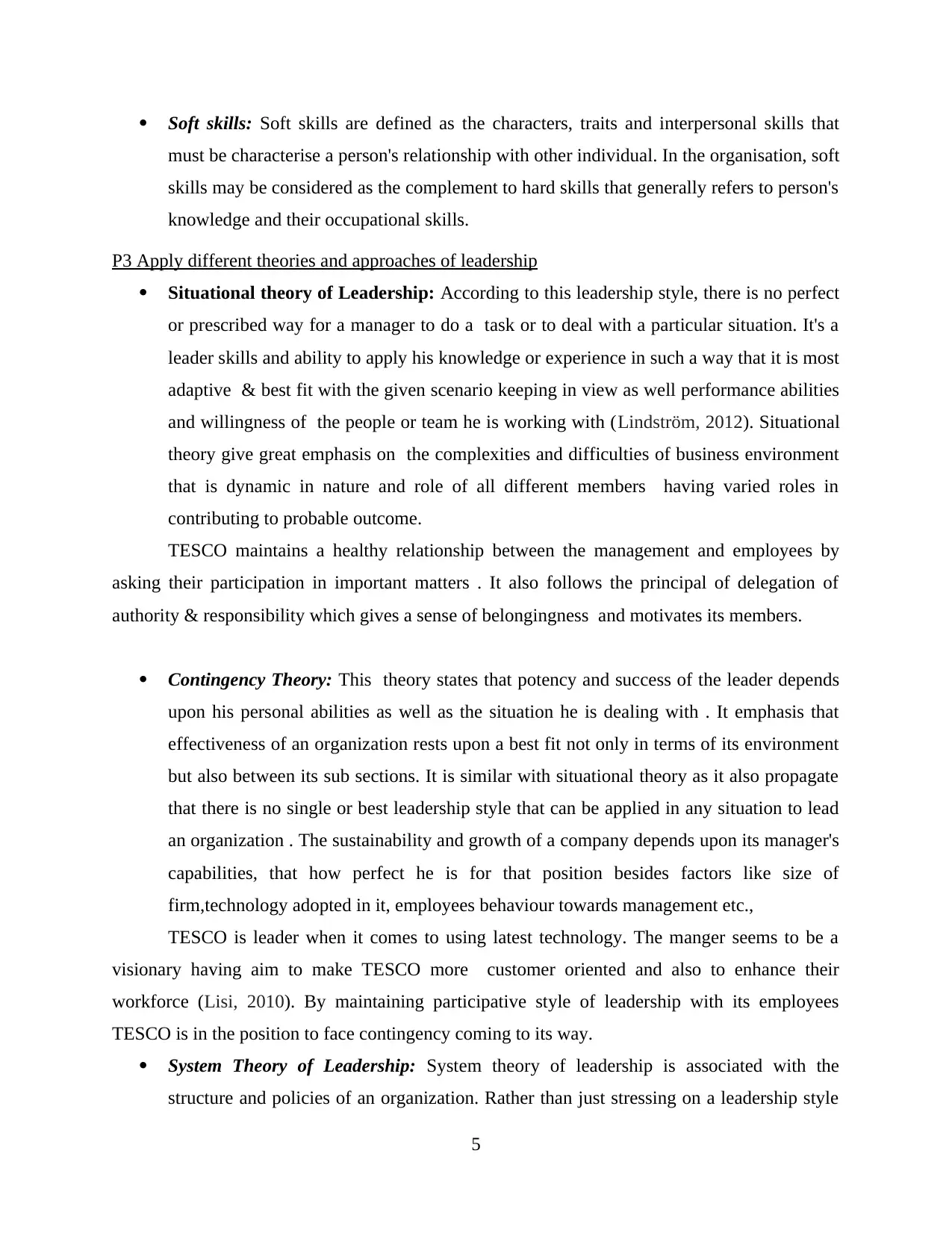
Soft skills: Soft skills are defined as the characters, traits and interpersonal skills that
must be characterise a person's relationship with other individual. In the organisation, soft
skills may be considered as the complement to hard skills that generally refers to person's
knowledge and their occupational skills.
P3 Apply different theories and approaches of leadership
Situational theory of Leadership: According to this leadership style, there is no perfect
or prescribed way for a manager to do a task or to deal with a particular situation. It's a
leader skills and ability to apply his knowledge or experience in such a way that it is most
adaptive & best fit with the given scenario keeping in view as well performance abilities
and willingness of the people or team he is working with (Lindström, 2012). Situational
theory give great emphasis on the complexities and difficulties of business environment
that is dynamic in nature and role of all different members having varied roles in
contributing to probable outcome.
TESCO maintains a healthy relationship between the management and employees by
asking their participation in important matters . It also follows the principal of delegation of
authority & responsibility which gives a sense of belongingness and motivates its members.
Contingency Theory: This theory states that potency and success of the leader depends
upon his personal abilities as well as the situation he is dealing with . It emphasis that
effectiveness of an organization rests upon a best fit not only in terms of its environment
but also between its sub sections. It is similar with situational theory as it also propagate
that there is no single or best leadership style that can be applied in any situation to lead
an organization . The sustainability and growth of a company depends upon its manager's
capabilities, that how perfect he is for that position besides factors like size of
firm,technology adopted in it, employees behaviour towards management etc.,
TESCO is leader when it comes to using latest technology. The manger seems to be a
visionary having aim to make TESCO more customer oriented and also to enhance their
workforce (Lisi, 2010). By maintaining participative style of leadership with its employees
TESCO is in the position to face contingency coming to its way.
System Theory of Leadership: System theory of leadership is associated with the
structure and policies of an organization. Rather than just stressing on a leadership style
5
must be characterise a person's relationship with other individual. In the organisation, soft
skills may be considered as the complement to hard skills that generally refers to person's
knowledge and their occupational skills.
P3 Apply different theories and approaches of leadership
Situational theory of Leadership: According to this leadership style, there is no perfect
or prescribed way for a manager to do a task or to deal with a particular situation. It's a
leader skills and ability to apply his knowledge or experience in such a way that it is most
adaptive & best fit with the given scenario keeping in view as well performance abilities
and willingness of the people or team he is working with (Lindström, 2012). Situational
theory give great emphasis on the complexities and difficulties of business environment
that is dynamic in nature and role of all different members having varied roles in
contributing to probable outcome.
TESCO maintains a healthy relationship between the management and employees by
asking their participation in important matters . It also follows the principal of delegation of
authority & responsibility which gives a sense of belongingness and motivates its members.
Contingency Theory: This theory states that potency and success of the leader depends
upon his personal abilities as well as the situation he is dealing with . It emphasis that
effectiveness of an organization rests upon a best fit not only in terms of its environment
but also between its sub sections. It is similar with situational theory as it also propagate
that there is no single or best leadership style that can be applied in any situation to lead
an organization . The sustainability and growth of a company depends upon its manager's
capabilities, that how perfect he is for that position besides factors like size of
firm,technology adopted in it, employees behaviour towards management etc.,
TESCO is leader when it comes to using latest technology. The manger seems to be a
visionary having aim to make TESCO more customer oriented and also to enhance their
workforce (Lisi, 2010). By maintaining participative style of leadership with its employees
TESCO is in the position to face contingency coming to its way.
System Theory of Leadership: System theory of leadership is associated with the
structure and policies of an organization. Rather than just stressing on a leadership style
5
Paraphrase This Document
Need a fresh take? Get an instant paraphrase of this document with our AI Paraphraser
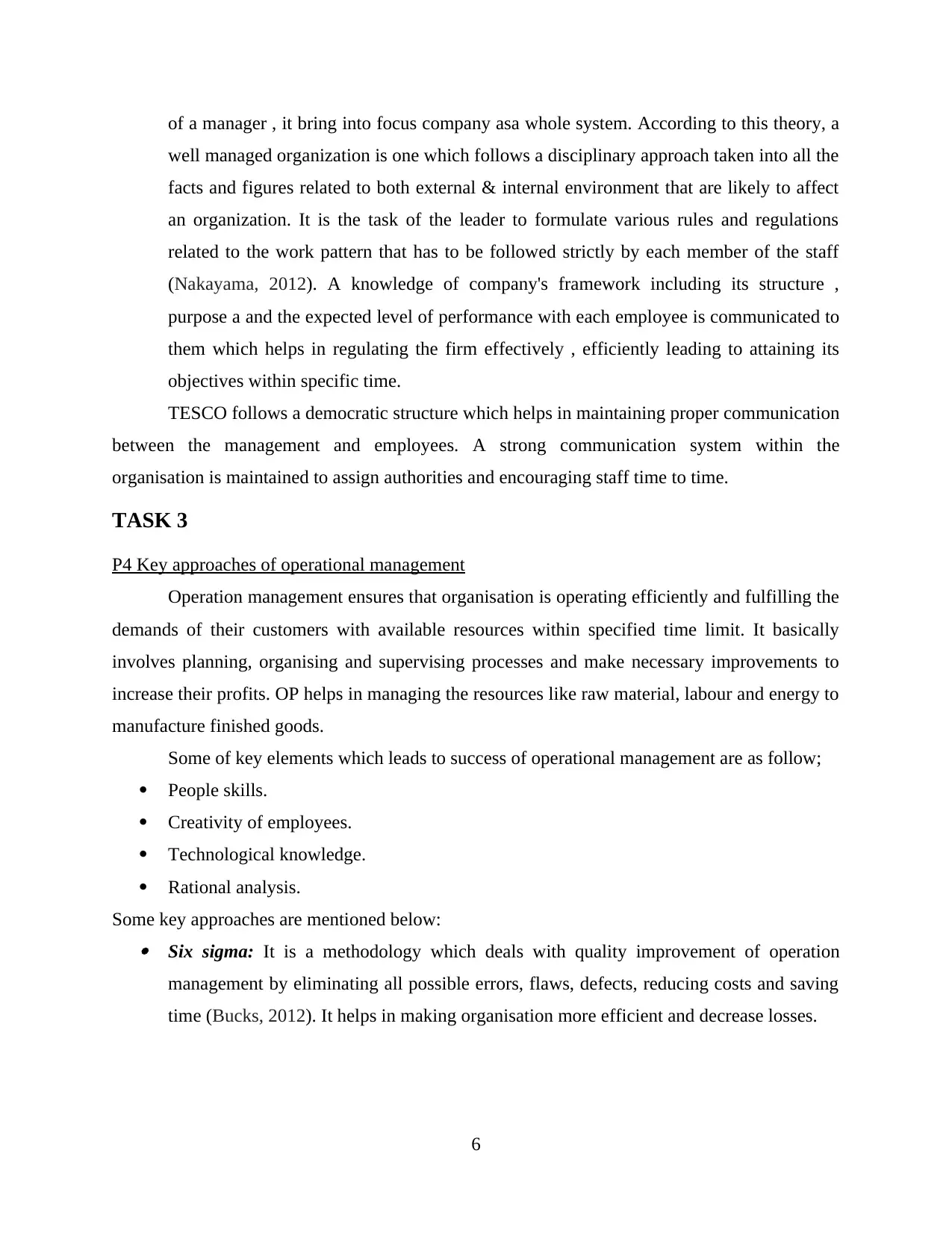
of a manager , it bring into focus company asa whole system. According to this theory, a
well managed organization is one which follows a disciplinary approach taken into all the
facts and figures related to both external & internal environment that are likely to affect
an organization. It is the task of the leader to formulate various rules and regulations
related to the work pattern that has to be followed strictly by each member of the staff
(Nakayama, 2012). A knowledge of company's framework including its structure ,
purpose a and the expected level of performance with each employee is communicated to
them which helps in regulating the firm effectively , efficiently leading to attaining its
objectives within specific time.
TESCO follows a democratic structure which helps in maintaining proper communication
between the management and employees. A strong communication system within the
organisation is maintained to assign authorities and encouraging staff time to time.
TASK 3
P4 Key approaches of operational management
Operation management ensures that organisation is operating efficiently and fulfilling the
demands of their customers with available resources within specified time limit. It basically
involves planning, organising and supervising processes and make necessary improvements to
increase their profits. OP helps in managing the resources like raw material, labour and energy to
manufacture finished goods.
Some of key elements which leads to success of operational management are as follow;
People skills.
Creativity of employees.
Technological knowledge.
Rational analysis.
Some key approaches are mentioned below: Six sigma: It is a methodology which deals with quality improvement of operation
management by eliminating all possible errors, flaws, defects, reducing costs and saving
time (Bucks, 2012). It helps in making organisation more efficient and decrease losses.
6
well managed organization is one which follows a disciplinary approach taken into all the
facts and figures related to both external & internal environment that are likely to affect
an organization. It is the task of the leader to formulate various rules and regulations
related to the work pattern that has to be followed strictly by each member of the staff
(Nakayama, 2012). A knowledge of company's framework including its structure ,
purpose a and the expected level of performance with each employee is communicated to
them which helps in regulating the firm effectively , efficiently leading to attaining its
objectives within specific time.
TESCO follows a democratic structure which helps in maintaining proper communication
between the management and employees. A strong communication system within the
organisation is maintained to assign authorities and encouraging staff time to time.
TASK 3
P4 Key approaches of operational management
Operation management ensures that organisation is operating efficiently and fulfilling the
demands of their customers with available resources within specified time limit. It basically
involves planning, organising and supervising processes and make necessary improvements to
increase their profits. OP helps in managing the resources like raw material, labour and energy to
manufacture finished goods.
Some of key elements which leads to success of operational management are as follow;
People skills.
Creativity of employees.
Technological knowledge.
Rational analysis.
Some key approaches are mentioned below: Six sigma: It is a methodology which deals with quality improvement of operation
management by eliminating all possible errors, flaws, defects, reducing costs and saving
time (Bucks, 2012). It helps in making organisation more efficient and decrease losses.
6
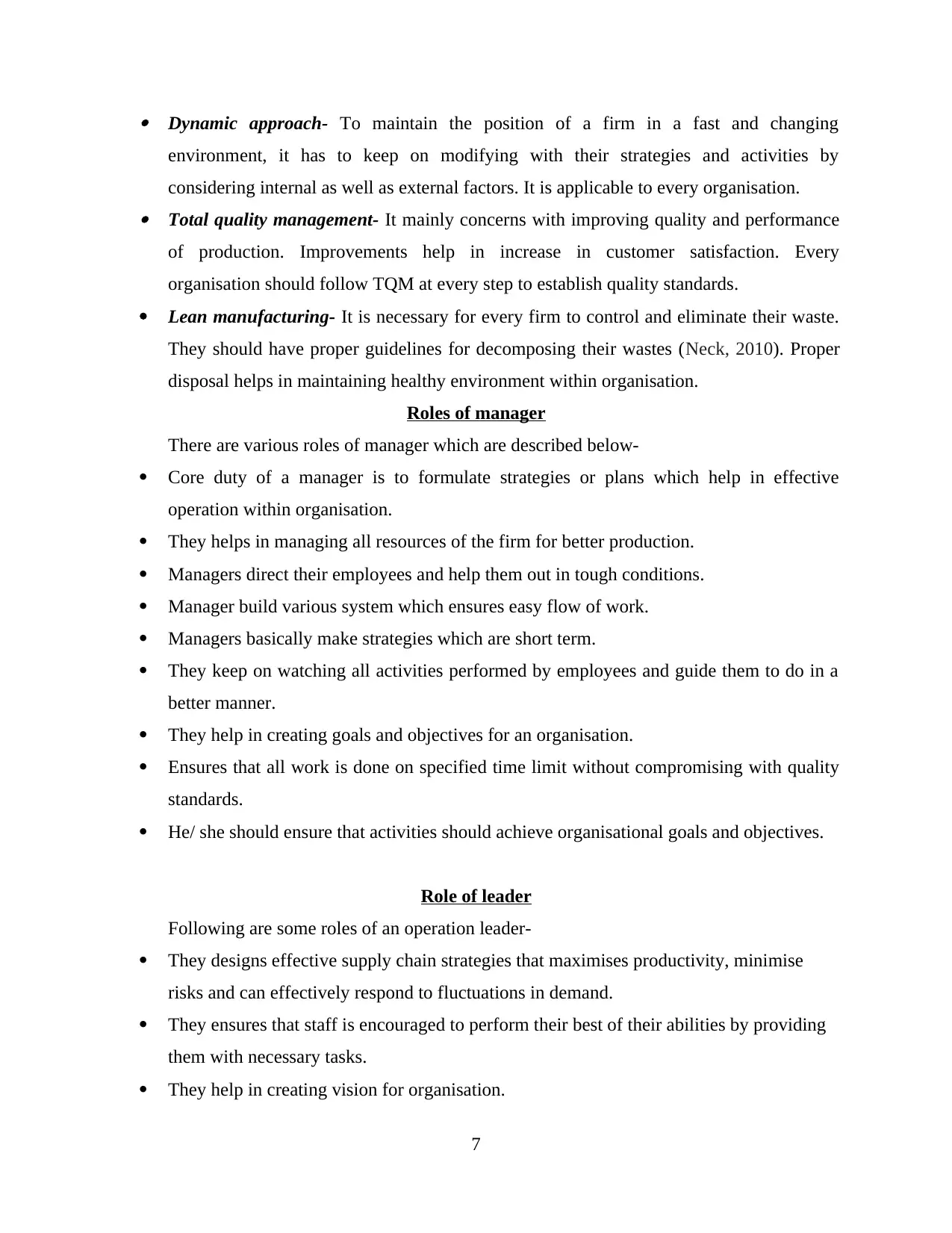
Dynamic approach- To maintain the position of a firm in a fast and changing
environment, it has to keep on modifying with their strategies and activities by
considering internal as well as external factors. It is applicable to every organisation. Total quality management- It mainly concerns with improving quality and performance
of production. Improvements help in increase in customer satisfaction. Every
organisation should follow TQM at every step to establish quality standards.
Lean manufacturing- It is necessary for every firm to control and eliminate their waste.
They should have proper guidelines for decomposing their wastes (Neck, 2010). Proper
disposal helps in maintaining healthy environment within organisation.
Roles of manager
There are various roles of manager which are described below-
Core duty of a manager is to formulate strategies or plans which help in effective
operation within organisation.
They helps in managing all resources of the firm for better production.
Managers direct their employees and help them out in tough conditions.
Manager build various system which ensures easy flow of work.
Managers basically make strategies which are short term.
They keep on watching all activities performed by employees and guide them to do in a
better manner.
They help in creating goals and objectives for an organisation.
Ensures that all work is done on specified time limit without compromising with quality
standards.
He/ she should ensure that activities should achieve organisational goals and objectives.
Role of leader
Following are some roles of an operation leader-
They designs effective supply chain strategies that maximises productivity, minimise
risks and can effectively respond to fluctuations in demand.
They ensures that staff is encouraged to perform their best of their abilities by providing
them with necessary tasks.
They help in creating vision for organisation.
7
environment, it has to keep on modifying with their strategies and activities by
considering internal as well as external factors. It is applicable to every organisation. Total quality management- It mainly concerns with improving quality and performance
of production. Improvements help in increase in customer satisfaction. Every
organisation should follow TQM at every step to establish quality standards.
Lean manufacturing- It is necessary for every firm to control and eliminate their waste.
They should have proper guidelines for decomposing their wastes (Neck, 2010). Proper
disposal helps in maintaining healthy environment within organisation.
Roles of manager
There are various roles of manager which are described below-
Core duty of a manager is to formulate strategies or plans which help in effective
operation within organisation.
They helps in managing all resources of the firm for better production.
Managers direct their employees and help them out in tough conditions.
Manager build various system which ensures easy flow of work.
Managers basically make strategies which are short term.
They keep on watching all activities performed by employees and guide them to do in a
better manner.
They help in creating goals and objectives for an organisation.
Ensures that all work is done on specified time limit without compromising with quality
standards.
He/ she should ensure that activities should achieve organisational goals and objectives.
Role of leader
Following are some roles of an operation leader-
They designs effective supply chain strategies that maximises productivity, minimise
risks and can effectively respond to fluctuations in demand.
They ensures that staff is encouraged to perform their best of their abilities by providing
them with necessary tasks.
They help in creating vision for organisation.
7
⊘ This is a preview!⊘
Do you want full access?
Subscribe today to unlock all pages.

Trusted by 1+ million students worldwide
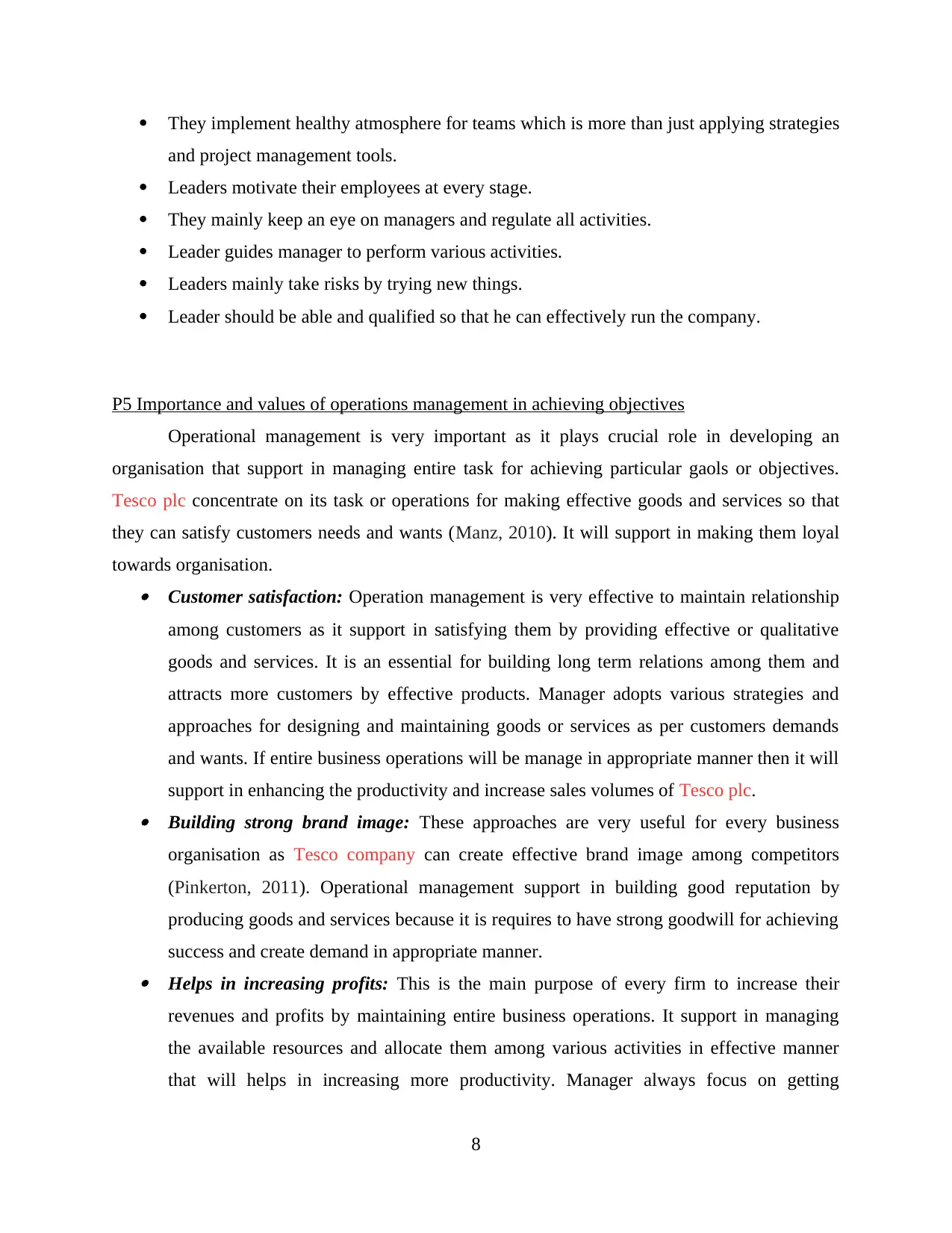
They implement healthy atmosphere for teams which is more than just applying strategies
and project management tools.
Leaders motivate their employees at every stage.
They mainly keep an eye on managers and regulate all activities.
Leader guides manager to perform various activities.
Leaders mainly take risks by trying new things.
Leader should be able and qualified so that he can effectively run the company.
P5 Importance and values of operations management in achieving objectives
Operational management is very important as it plays crucial role in developing an
organisation that support in managing entire task for achieving particular gaols or objectives.
Tesco plc concentrate on its task or operations for making effective goods and services so that
they can satisfy customers needs and wants (Manz, 2010). It will support in making them loyal
towards organisation. Customer satisfaction: Operation management is very effective to maintain relationship
among customers as it support in satisfying them by providing effective or qualitative
goods and services. It is an essential for building long term relations among them and
attracts more customers by effective products. Manager adopts various strategies and
approaches for designing and maintaining goods or services as per customers demands
and wants. If entire business operations will be manage in appropriate manner then it will
support in enhancing the productivity and increase sales volumes of Tesco plc. Building strong brand image: These approaches are very useful for every business
organisation as Tesco company can create effective brand image among competitors
(Pinkerton, 2011). Operational management support in building good reputation by
producing goods and services because it is requires to have strong goodwill for achieving
success and create demand in appropriate manner. Helps in increasing profits: This is the main purpose of every firm to increase their
revenues and profits by maintaining entire business operations. It support in managing
the available resources and allocate them among various activities in effective manner
that will helps in increasing more productivity. Manager always focus on getting
8
and project management tools.
Leaders motivate their employees at every stage.
They mainly keep an eye on managers and regulate all activities.
Leader guides manager to perform various activities.
Leaders mainly take risks by trying new things.
Leader should be able and qualified so that he can effectively run the company.
P5 Importance and values of operations management in achieving objectives
Operational management is very important as it plays crucial role in developing an
organisation that support in managing entire task for achieving particular gaols or objectives.
Tesco plc concentrate on its task or operations for making effective goods and services so that
they can satisfy customers needs and wants (Manz, 2010). It will support in making them loyal
towards organisation. Customer satisfaction: Operation management is very effective to maintain relationship
among customers as it support in satisfying them by providing effective or qualitative
goods and services. It is an essential for building long term relations among them and
attracts more customers by effective products. Manager adopts various strategies and
approaches for designing and maintaining goods or services as per customers demands
and wants. If entire business operations will be manage in appropriate manner then it will
support in enhancing the productivity and increase sales volumes of Tesco plc. Building strong brand image: These approaches are very useful for every business
organisation as Tesco company can create effective brand image among competitors
(Pinkerton, 2011). Operational management support in building good reputation by
producing goods and services because it is requires to have strong goodwill for achieving
success and create demand in appropriate manner. Helps in increasing profits: This is the main purpose of every firm to increase their
revenues and profits by maintaining entire business operations. It support in managing
the available resources and allocate them among various activities in effective manner
that will helps in increasing more productivity. Manager always focus on getting
8
Paraphrase This Document
Need a fresh take? Get an instant paraphrase of this document with our AI Paraphraser
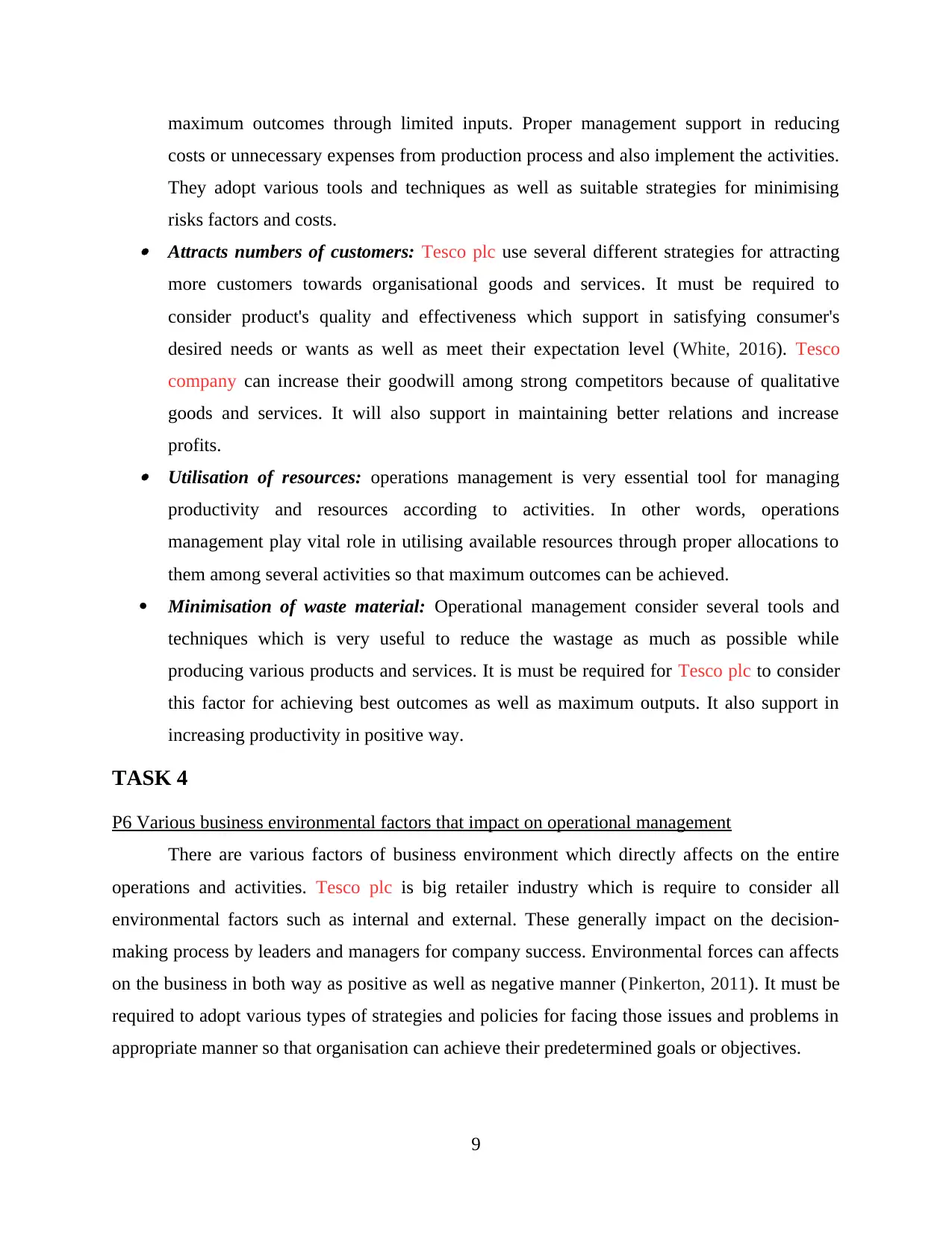
maximum outcomes through limited inputs. Proper management support in reducing
costs or unnecessary expenses from production process and also implement the activities.
They adopt various tools and techniques as well as suitable strategies for minimising
risks factors and costs. Attracts numbers of customers: Tesco plc use several different strategies for attracting
more customers towards organisational goods and services. It must be required to
consider product's quality and effectiveness which support in satisfying consumer's
desired needs or wants as well as meet their expectation level (White, 2016). Tesco
company can increase their goodwill among strong competitors because of qualitative
goods and services. It will also support in maintaining better relations and increase
profits. Utilisation of resources: operations management is very essential tool for managing
productivity and resources according to activities. In other words, operations
management play vital role in utilising available resources through proper allocations to
them among several activities so that maximum outcomes can be achieved.
Minimisation of waste material: Operational management consider several tools and
techniques which is very useful to reduce the wastage as much as possible while
producing various products and services. It is must be required for Tesco plc to consider
this factor for achieving best outcomes as well as maximum outputs. It also support in
increasing productivity in positive way.
TASK 4
P6 Various business environmental factors that impact on operational management
There are various factors of business environment which directly affects on the entire
operations and activities. Tesco plc is big retailer industry which is require to consider all
environmental factors such as internal and external. These generally impact on the decision-
making process by leaders and managers for company success. Environmental forces can affects
on the business in both way as positive as well as negative manner (Pinkerton, 2011). It must be
required to adopt various types of strategies and policies for facing those issues and problems in
appropriate manner so that organisation can achieve their predetermined goals or objectives.
9
costs or unnecessary expenses from production process and also implement the activities.
They adopt various tools and techniques as well as suitable strategies for minimising
risks factors and costs. Attracts numbers of customers: Tesco plc use several different strategies for attracting
more customers towards organisational goods and services. It must be required to
consider product's quality and effectiveness which support in satisfying consumer's
desired needs or wants as well as meet their expectation level (White, 2016). Tesco
company can increase their goodwill among strong competitors because of qualitative
goods and services. It will also support in maintaining better relations and increase
profits. Utilisation of resources: operations management is very essential tool for managing
productivity and resources according to activities. In other words, operations
management play vital role in utilising available resources through proper allocations to
them among several activities so that maximum outcomes can be achieved.
Minimisation of waste material: Operational management consider several tools and
techniques which is very useful to reduce the wastage as much as possible while
producing various products and services. It is must be required for Tesco plc to consider
this factor for achieving best outcomes as well as maximum outputs. It also support in
increasing productivity in positive way.
TASK 4
P6 Various business environmental factors that impact on operational management
There are various factors of business environment which directly affects on the entire
operations and activities. Tesco plc is big retailer industry which is require to consider all
environmental factors such as internal and external. These generally impact on the decision-
making process by leaders and managers for company success. Environmental forces can affects
on the business in both way as positive as well as negative manner (Pinkerton, 2011). It must be
required to adopt various types of strategies and policies for facing those issues and problems in
appropriate manner so that organisation can achieve their predetermined goals or objectives.
9
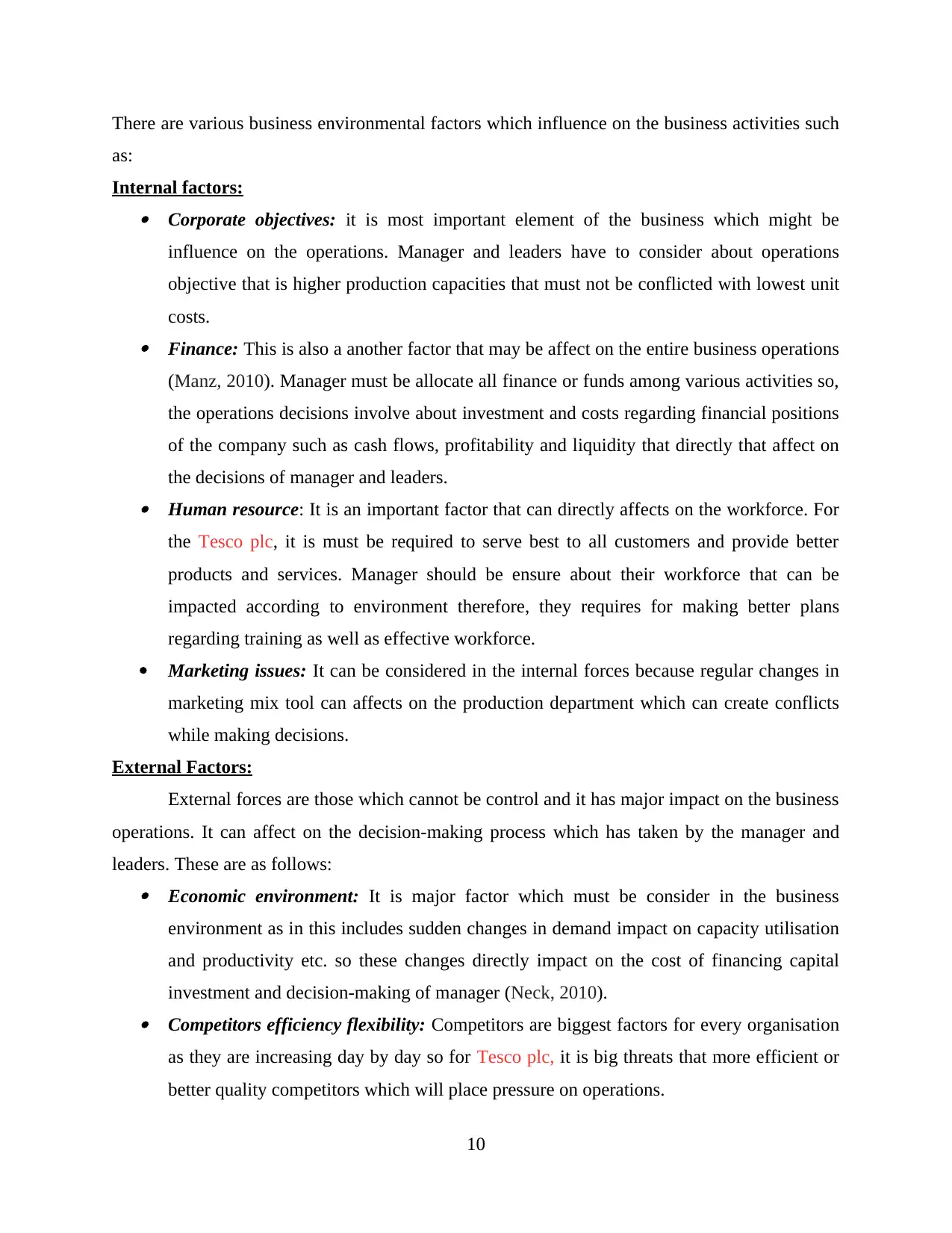
There are various business environmental factors which influence on the business activities such
as:
Internal factors: Corporate objectives: it is most important element of the business which might be
influence on the operations. Manager and leaders have to consider about operations
objective that is higher production capacities that must not be conflicted with lowest unit
costs. Finance: This is also a another factor that may be affect on the entire business operations
(Manz, 2010). Manager must be allocate all finance or funds among various activities so,
the operations decisions involve about investment and costs regarding financial positions
of the company such as cash flows, profitability and liquidity that directly that affect on
the decisions of manager and leaders. Human resource: It is an important factor that can directly affects on the workforce. For
the Tesco plc, it is must be required to serve best to all customers and provide better
products and services. Manager should be ensure about their workforce that can be
impacted according to environment therefore, they requires for making better plans
regarding training as well as effective workforce.
Marketing issues: It can be considered in the internal forces because regular changes in
marketing mix tool can affects on the production department which can create conflicts
while making decisions.
External Factors:
External forces are those which cannot be control and it has major impact on the business
operations. It can affect on the decision-making process which has taken by the manager and
leaders. These are as follows: Economic environment: It is major factor which must be consider in the business
environment as in this includes sudden changes in demand impact on capacity utilisation
and productivity etc. so these changes directly impact on the cost of financing capital
investment and decision-making of manager (Neck, 2010). Competitors efficiency flexibility: Competitors are biggest factors for every organisation
as they are increasing day by day so for Tesco plc, it is big threats that more efficient or
better quality competitors which will place pressure on operations.
10
as:
Internal factors: Corporate objectives: it is most important element of the business which might be
influence on the operations. Manager and leaders have to consider about operations
objective that is higher production capacities that must not be conflicted with lowest unit
costs. Finance: This is also a another factor that may be affect on the entire business operations
(Manz, 2010). Manager must be allocate all finance or funds among various activities so,
the operations decisions involve about investment and costs regarding financial positions
of the company such as cash flows, profitability and liquidity that directly that affect on
the decisions of manager and leaders. Human resource: It is an important factor that can directly affects on the workforce. For
the Tesco plc, it is must be required to serve best to all customers and provide better
products and services. Manager should be ensure about their workforce that can be
impacted according to environment therefore, they requires for making better plans
regarding training as well as effective workforce.
Marketing issues: It can be considered in the internal forces because regular changes in
marketing mix tool can affects on the production department which can create conflicts
while making decisions.
External Factors:
External forces are those which cannot be control and it has major impact on the business
operations. It can affect on the decision-making process which has taken by the manager and
leaders. These are as follows: Economic environment: It is major factor which must be consider in the business
environment as in this includes sudden changes in demand impact on capacity utilisation
and productivity etc. so these changes directly impact on the cost of financing capital
investment and decision-making of manager (Neck, 2010). Competitors efficiency flexibility: Competitors are biggest factors for every organisation
as they are increasing day by day so for Tesco plc, it is big threats that more efficient or
better quality competitors which will place pressure on operations.
10
⊘ This is a preview!⊘
Do you want full access?
Subscribe today to unlock all pages.

Trusted by 1+ million students worldwide
1 out of 14
Related Documents
Your All-in-One AI-Powered Toolkit for Academic Success.
+13062052269
info@desklib.com
Available 24*7 on WhatsApp / Email
![[object Object]](/_next/static/media/star-bottom.7253800d.svg)
Unlock your academic potential
Copyright © 2020–2026 A2Z Services. All Rights Reserved. Developed and managed by ZUCOL.




